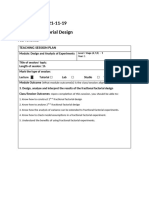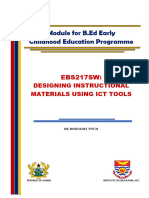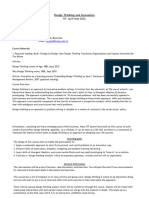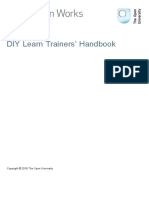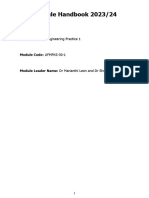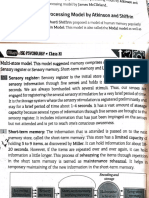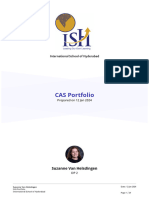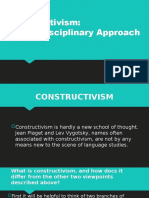GLMI 712 S1 2020 Course Outline
GLMI 712 S1 2020 Course Outline
Uploaded by
rivai anwarCopyright:
Available Formats
GLMI 712 S1 2020 Course Outline
GLMI 712 S1 2020 Course Outline
Uploaded by
rivai anwarOriginal Title
Copyright
Available Formats
Share this document
Did you find this document useful?
Is this content inappropriate?
Copyright:
Available Formats
GLMI 712 S1 2020 Course Outline
GLMI 712 S1 2020 Course Outline
Uploaded by
rivai anwarCopyright:
Available Formats
Course Outline 2020
GLMI 712: UNDERSTANDING AND MANAGEING CREATIVITY (15 POINTS)
Semester 1, (1203)
Course prescription
Explores theories and research on creativity in both well-established and
entrepreneurial organisations at different levels of analysis – individual, groups
and firms. Includes topics such as factors impacting creativity, how to manage
creative teams and individuals, and how to develop a creative climate in the
organisation.
Course advice
This course is designed for students seeking to deepen and expand their critical
understanding of innovation, entrepreneurship and creative processes in
individuals and organisations.
Goals of the course
This course attracts students looking to explore the concept of creativity in-
depth and from an organisational perspective. Students are exposed to a broad
range of (sometimes competing) approaches to understanding and managing
creativity at various organisational levels - from the individual level to the
broader organisation and beyond. The relationships between entrepreneurship,
innovation and creativity also form a key component of this course. Whilst
studying creativity theoretically, students are expected to apply their insights
and approach learning in creative and collaborative ways throughout the
Semester. In order to succeed in this course, students should be open to
reading widely from a range of disciplines, willing to discuss ideas with others
and ready to challenge themselves to try new things.
Learning outcomes (LO)
By the end of the course, it is expected that students will be able to:
# Learning outcome Graduate profile capability*
LO1 Understand the theoretical and Select from the drop-down list.
practical perspectives of creativity
within the context of 1. Disciplinary knowledge and practice
entrepreneurship and innovation
Version Date 180806 Page 1 of 5
# Learning outcome Graduate profile capability*
LO2 Evaluate factors that might impede 3. Solution seeking
and/or enhance creativity in
entrepreneurial and innovative 2. Critical thinking
contexts
LO3 Assess the challenges of managing 1. Disciplinary knowledge and practice
creativity in a variety of
organisational contexts and across 2. Critical thinking
different levels of analysis including
individual, groups and firms
LO4 Articulate and apply personal 5a. Independence
approaches to creativity in both
individual and group work through Choose a second capability or leave blank.
creative practice and reflection
LO5 Develop and demonstrate 4c. Engagement (Collaboration)
interpersonal communication skills
through teamwork, collaboration 4a. Communication (Oral)
and workshop delivery
* See the graduate profile this course belongs to at the end of this course outline.
Content outline
Week / Relevant learning Assessment due this
Topic
Module resources/activities period
1 Introduction to class CANVAS: Syllabus and
and creativity Assignments
2 Creativity, Innovation Assigned readings
and Entrepreneurship
3 Collaborative Assigned readings
creativity: Lego Class will run in Unleash
Serious Play Space (Engineering
Building)
4 Creativity and Assigned readings Draft essay due for peer
Innovation Case Study evaluation
5 Creativity paradoxes Assigned readings
and challenges
6 Creativity and design Assigned readings Non-assessed draft/plan
thinking Team assessment for team project case
workshop due – followed by Peer
Evaluation 1
7 Creativity in Action Site visit (TBC) Essay due Wednesday
9am
8 Facilitated in class Team assessment
workshop
9 Facilitated in class Team assessment
workshop
10 Facilitated in class Team assessment
workshop Peer evaluation 2
11 Tech challenge Tech challenge
presentations
12 Tech challenge Tech challenge
Version Date 180806 Page 2 of 5
Week / Relevant learning Assessment due this
Topic
Module resources/activities period
presentations
Learning and teaching
This class will meet for three hours, once a week on Wednesdays 9-12, over the
course of the semester. These classes will consist of discussions and
presentations, so it is expected that students will come to class prepared to
contribute.
Students will need to read all assigned readings prior to class in order to
effectively engage in class activities.
The course is not designed to be ‘lectured’ and students are encouraged to take
a proactive and participatory role in co-creating course content.
Teaching staff
Dr Rhiannon Lloyd
Office: Room 4120, Owen G. Glenn Building
Email: rhiannon.lloyd@auckland.ac.nz
Learning resources
There is no textbook prescribed for the class. We will use a range of journal
articles, book chapters, video clips and news articles. Readings will be available
through Canvas
Assessment information
Group and/or
Assessment task Weight % Submission
individual
Critical essay on creativity,
entrepreneurship and Week 7 Wednesday
30 Individual
innovation 9am
Team project and facilitated
workshop 40 Group In class weeks 8-10
Individual technology
challenge, and
30 Individual In class weeks 11-12
accompanying reflective
insights
Description of assessment tasks
Learning outcome to
Assessment task
be assessed
Critical essay on creativity in entrepreneurship and
innovation 1, 2 & 3
Team project and facilitated workshop 2, 4 & 5
Version Date 180806 Page 3 of 5
Learning outcome to
Assessment task
be assessed
Individual technology challenge, and accompanying
1&4
reflective insights
Inclusive learning
Students are urged to discuss privately any impairment-related requirements face-to-
face and/or in written form with the courses convenor/lecturer and/or tutor.
Academic integrity
The University of Auckland will not tolerate cheating, or assisting others to cheat, and
views cheating in coursework as a serious academic offence. The work that a student
submits for grading must be the student’s own work, reflecting his or her learning.
Where work from other sources is used, it must be properly acknowledged and
referenced. This requirement also applies to sources on the worldwide web. A student’s
assessed work may be reviewed against electronic source material using computerised
detection to provide an electronic version of their work for computerised review.
Student feedback
At the end of every semester students will be invited to give feedback on the course and
teaching through a tool called SET. The lecturers and course co-ordinators will consider
all feedback and respond with summaries and actions.
Your feedback helps teachers to improve the course and its delivery for future students.
In the event of an unexpected disruption
We undertake to maintain the continuity and standard of teaching and learning in all
your courses throughout the year. If there are unexpected disruptions, the University
has contingency plans to ensure that access to your course continues and your
assessment is fair, and not compromised. Some adjustments may need to be made in
emergencies, In the event of a disruption, the University and your course coordinators
will make every effort to provide you with up to date information via Canvas and the
University website.
Graduate profile for MCom
The following six themes represent the capabilities that the Business School seeks to
foster in all of its graduates. The development of these capabilities does not come all at
once, but rather is expected to build from year to year. Each course is not expected to
contribute to all capabilities, but each course will have its own goals and learning
outcomes that relate to the overall development of this profile.
Graduate Profile for Master of Commerce
1. Disciplinary knowledge and practice
Graduates will be able to apply highly specialised knowledge within the discipline
to demonstrate an advanced awareness and understanding in a global context.
1. Critical thinking
Version Date 180806 Page 4 of 5
Graduate Profile for Master of Commerce
Graduates will be able to analyse and evaluate the relevant literature, and design
and develop scholarly arguments that demonstrate advanced and diverse
thinking.
2. Solution seeking
Graduates will be able to creatively research and analyse complex issues, and
develop innovative solutions.
3. Communication and engagement
Graduates will be able to engage, communicate, and collaborate with diverse
groups using multiple formats and effectively address a range of professional and
academic audiences.
4. Independence and integrity
Graduates will be able to demonstrate advanced independent thought, self-
reflection, ethics, and integrity.
5. Social and environmental responsibility
Graduates will consider, in relation to their discipline, the potential significance of
the principles underpinning both the Treaty of Waitangi and sustainability.
Version Date 180806 Page 5 of 5
You might also like
- Coursera International Business - Course 1 Week 2Document4 pagesCoursera International Business - Course 1 Week 2prathamgoNo ratings yet
- Free Hogan Personality Inventory - HPI OnlineDocument1 pageFree Hogan Personality Inventory - HPI Onlinerivai anwarNo ratings yet
- Assessment of Learning 2 ModuleDocument138 pagesAssessment of Learning 2 ModuleShim Yhung Rae94% (16)
- Edukasyong Pangtahanan at Pangkabuhayan With Entrepreneurship 1Document4 pagesEdukasyong Pangtahanan at Pangkabuhayan With Entrepreneurship 1cristine joyce80% (5)
- Mental Health in The Workplace 101Document11 pagesMental Health in The Workplace 101Jet Bongabong86% (7)
- Cca MDDocument6 pagesCca MDjeeyakoNo ratings yet
- CB4605Document7 pagesCB4605Alex ZhangNo ratings yet
- Managing The Entrepreneurial Venture II - BBADocument5 pagesManaging The Entrepreneurial Venture II - BBABISMA RAFIQNo ratings yet
- MGT409 - GDIB - Course OutlineDocument3 pagesMGT409 - GDIB - Course OutlineRamya Teja VemulaNo ratings yet
- PWSU - Professional Competencies - August 20202docxDocument7 pagesPWSU - Professional Competencies - August 20202docxThảo NguyễnNo ratings yet
- Lessonplan 1Document6 pagesLessonplan 1hritik999rajNo ratings yet
- Business Communication 10 3 22 04042022 113953amDocument7 pagesBusiness Communication 10 3 22 04042022 113953amsikander jalalNo ratings yet
- CSIT111 SubjectOutline July2017Document8 pagesCSIT111 SubjectOutline July2017Viknesh ThevarNo ratings yet
- OB Course Outline Spring 2022Document6 pagesOB Course Outline Spring 2022Muhammad Pannah Junejo Shoukat Ali JunejoNo ratings yet
- Introduction To OBE SystemDocument26 pagesIntroduction To OBE SystemYari khanNo ratings yet
- Power Point For Week 1 - ENGG980 - Introduction-V2Document17 pagesPower Point For Week 1 - ENGG980 - Introduction-V2PamithaNo ratings yet
- Instructional PlanDocument3 pagesInstructional Planshielaquizana23No ratings yet
- Module 5Document18 pagesModule 5Dexther JalitNo ratings yet
- City University of Hong Kong Course Syllabus Offered by Department of Electronic Engineering With Effect From Semester A in 2017/2018Document5 pagesCity University of Hong Kong Course Syllabus Offered by Department of Electronic Engineering With Effect From Semester A in 2017/2018aaaNo ratings yet
- PBLDocument10 pagesPBLKerol Kerol KerolNo ratings yet
- Design Thinking Course OutlineDocument3 pagesDesign Thinking Course Outlinesumit royNo ratings yet
- O3 - D1 Guidelines For The CV Implementation in Companies and VET ProvidersDocument91 pagesO3 - D1 Guidelines For The CV Implementation in Companies and VET Providers18rosa18No ratings yet
- ECED - Learner Centered Teaching PDFDocument3 pagesECED - Learner Centered Teaching PDFCT AicirtNo ratings yet
- PBLWorks Project Planner v2019 Notes 0Document4 pagesPBLWorks Project Planner v2019 Notes 0Rene A. Gomez BendañaNo ratings yet
- Planning Your Steam Learning.: Project-BasedDocument13 pagesPlanning Your Steam Learning.: Project-BasedTeoNo ratings yet
- Group 13 - Designing EFL Project With PBL ApproachesDocument24 pagesGroup 13 - Designing EFL Project With PBL Approachespuma houyoNo ratings yet
- Module 9 Methods in Language Teaching INCDocument7 pagesModule 9 Methods in Language Teaching INCmarco medurandaNo ratings yet
- Draft: NYU Stern Innovation & Design SyllabusDocument11 pagesDraft: NYU Stern Innovation & Design SyllabusaakashchandraNo ratings yet
- 01 - Pertemuan Ke 3 Substansi DT Via PBL 2022 - 2024 English Version - MandatoryDocument40 pages01 - Pertemuan Ke 3 Substansi DT Via PBL 2022 - 2024 English Version - MandatoryEllya DamayantiNo ratings yet
- Professional Development AnalysisDocument13 pagesProfessional Development Analysisapi-513928230No ratings yet
- City University of Hong Kong Course Syllabus Offered by Department of Computer Science With Effect From Semester A 2015/16Document5 pagesCity University of Hong Kong Course Syllabus Offered by Department of Computer Science With Effect From Semester A 2015/16Dylam LamNo ratings yet
- Unit 6 Activity 6Document10 pagesUnit 6 Activity 6Marian SalidoNo ratings yet
- Business Speech Course OutlineDocument26 pagesBusiness Speech Course Outlineace rogerNo ratings yet
- Ebs 217SW - Designing Instructional Materials Using IctDocument98 pagesEbs 217SW - Designing Instructional Materials Using IctKC Mae NapiñasNo ratings yet
- DLP GRADE 10 3rd Quarter - (33-36)Document25 pagesDLP GRADE 10 3rd Quarter - (33-36)Liezl Marie YrabonNo ratings yet
- Ob-IiDocument5 pagesOb-IiRupam ChakrabortyNo ratings yet
- PR Ject: D LearningDocument22 pagesPR Ject: D LearningpuniariNo ratings yet
- Academic Literacy Study Guide 2020 - Semester 2Document58 pagesAcademic Literacy Study Guide 2020 - Semester 2Nosipho NxumaloNo ratings yet
- Dlp-Et 6Document3 pagesDlp-Et 6xinxiancalvoforschoolNo ratings yet
- High Performance HR PracticesDocument10 pagesHigh Performance HR PracticesdheerajNo ratings yet
- Outline MNGT3556 FL23Document6 pagesOutline MNGT3556 FL23aBaDy 185No ratings yet
- Project Management SyllabusDocument3 pagesProject Management SyllabusAkash Amiangshu DuttaNo ratings yet
- Sc2a Assessment Task 2 Hao Li 19710525Document14 pagesSc2a Assessment Task 2 Hao Li 19710525api-532454815No ratings yet
- Practical Research 2 DLP 26Document5 pagesPractical Research 2 DLP 26abellanamarzelleNo ratings yet
- Unit 6 Activity 6Document9 pagesUnit 6 Activity 6Marian SalidoNo ratings yet
- Course Syllabus - Math 113 - Integral CalculusDocument5 pagesCourse Syllabus - Math 113 - Integral CalculusSalvacion Paul Niño L.No ratings yet
- EDU204 Course Outline Semester 2 2020Document8 pagesEDU204 Course Outline Semester 2 2020Maddy ColamNo ratings yet
- City University of Hong Kong Course Syllabus Offered by Department of Electrical Engineering With Effect From Semester A in 2017/2018Document6 pagesCity University of Hong Kong Course Syllabus Offered by Department of Electrical Engineering With Effect From Semester A in 2017/2018aaaNo ratings yet
- Design Thinking and Innovation Course Outline - ZZZZDocument5 pagesDesign Thinking and Innovation Course Outline - ZZZZsagar23singhalNo ratings yet
- CB3021Document6 pagesCB3021Alex ZhangNo ratings yet
- SYLLABUS-CE Project 1Document6 pagesSYLLABUS-CE Project 1Erika Joy AbalosNo ratings yet
- TEACHING INTERNSHIP PROGRAM Documents 2nd Sem AY 2023 2024Document7 pagesTEACHING INTERNSHIP PROGRAM Documents 2nd Sem AY 2023 2024Mark Jefferson MartinNo ratings yet
- Practical Research 2 DLP 26Document5 pagesPractical Research 2 DLP 26Jumps Laroa50% (4)
- Assignment 2 Smith CynthiaDocument5 pagesAssignment 2 Smith CynthiaCindy SmithNo ratings yet
- Diy Learn Trainers Handbook PrintableDocument22 pagesDiy Learn Trainers Handbook PrintableKESNo ratings yet
- UFMFKS-30-1 Module Handbook 23-24Document11 pagesUFMFKS-30-1 Module Handbook 23-24Nikhil BijuNo ratings yet
- 5th Year Construction Studies SchemeDocument5 pages5th Year Construction Studies Schemeapi-350526786No ratings yet
- 3.1 Technoprneurship For EngineersDocument3 pages3.1 Technoprneurship For EngineersErika Joy AbalosNo ratings yet
- 2023 - Pekerti - Team Based ProjectDocument20 pages2023 - Pekerti - Team Based ProjectKhairul BariyyahNo ratings yet
- Course-Activity-Worksheet TTL2-W4-1Document9 pagesCourse-Activity-Worksheet TTL2-W4-1Era G. DumangcasNo ratings yet
- Module 1Document25 pagesModule 1Dexther JalitNo ratings yet
- MIT4203 Core: Total Learning Hour (TLH) : 120Document5 pagesMIT4203 Core: Total Learning Hour (TLH) : 120Dr S B GoyalNo ratings yet
- RadiologistDocument8 pagesRadiologistrivai anwarNo ratings yet
- 1 s2.0 S0090429520301618 MainDocument6 pages1 s2.0 S0090429520301618 Mainrivai anwarNo ratings yet
- Hospital PneumoniaDocument15 pagesHospital Pneumoniarivai anwarNo ratings yet
- An Updated Conceptual Model of The Tompaso Geothermal Field Using Numerical SimulationDocument9 pagesAn Updated Conceptual Model of The Tompaso Geothermal Field Using Numerical Simulationrivai anwarNo ratings yet
- Americas Cup Case StudyDocument21 pagesAmericas Cup Case Studyrivai anwarNo ratings yet
- Peer Evaluation Form. GLMI 712 Round 2.: You Have 100 Total Points To Distribute Out To Your TeammatesDocument1 pagePeer Evaluation Form. GLMI 712 Round 2.: You Have 100 Total Points To Distribute Out To Your Teammatesrivai anwarNo ratings yet
- Value Creation and Value Capture in Open InnovationDocument9 pagesValue Creation and Value Capture in Open Innovationrivai anwarNo ratings yet
- Overview Success Criteria and Critical Success Factors in Projectmanagement 2169 0316 1000244Document7 pagesOverview Success Criteria and Critical Success Factors in Projectmanagement 2169 0316 1000244rivai anwarNo ratings yet
- XPAC For Beginner Part2 (Ok)Document32 pagesXPAC For Beginner Part2 (Ok)rivai anwar100% (1)
- Atkinson Shiffrin Model Class11Document3 pagesAtkinson Shiffrin Model Class11Pushkar DuttaNo ratings yet
- Chapter 2 - Interpersonal RelationshipsDocument29 pagesChapter 2 - Interpersonal RelationshipsGirum Solomon0% (1)
- 365 Days of Motivation-2012Document14 pages365 Days of Motivation-2012markamomentNo ratings yet
- Literature Review of Family Planning ResearchDocument8 pagesLiterature Review of Family Planning Researchaflsjizaf100% (1)
- Neural Correlates of Deceased-Related Attention During Acute Grief inDocument8 pagesNeural Correlates of Deceased-Related Attention During Acute Grief inselinashen719No ratings yet
- PRELIMS GROUP Foundation of Curriculum.Document12 pagesPRELIMS GROUP Foundation of Curriculum.Beberly Kim AmaroNo ratings yet
- NAVEDTRA 14172 Navy Counselor 1 & C (Recruiter)Document312 pagesNAVEDTRA 14172 Navy Counselor 1 & C (Recruiter)hackbrian003No ratings yet
- 2 Functions Roles and Skills of A ManagerDocument14 pages2 Functions Roles and Skills of A Managerdaliahagustin47No ratings yet
- The Five Paragraph Essay: Week Four, Part TwoDocument29 pagesThe Five Paragraph Essay: Week Four, Part TwoFarhang Abdalla IsmaelNo ratings yet
- Suzanne - CAS Portfolio - Batch of 2024Document29 pagesSuzanne - CAS Portfolio - Batch of 2024Riya LoyolaNo ratings yet
- Introduction To Nursing ManagementDocument19 pagesIntroduction To Nursing ManagementMUTHUKUMARAN100% (2)
- Lif Vis Pol Int Unit 1a Answer KeyDocument4 pagesLif Vis Pol Int Unit 1a Answer KeyolsNo ratings yet
- Mi TodoDocument21 pagesMi Todostanleeeeeeee18No ratings yet
- Team Case Analysis Instructions and RubricDocument2 pagesTeam Case Analysis Instructions and RubricCole SooyNo ratings yet
- Sample Answer: (235 Words)Document3 pagesSample Answer: (235 Words)Карина БаранскаяNo ratings yet
- Conscious MIND Resonant BRAINDocument17 pagesConscious MIND Resonant BRAINHernán BordaNo ratings yet
- EXAMEN ORDINARIO - UPGRADE - B1+ - Unit 1Document2 pagesEXAMEN ORDINARIO - UPGRADE - B1+ - Unit 1Jazmin Damian CamposNo ratings yet
- Arthur C. Danto - Analytical Philosophy of Action-Cambridge University Press (1973)Document248 pagesArthur C. Danto - Analytical Philosophy of Action-Cambridge University Press (1973)Nada NadieNo ratings yet
- The A.R.S. Report - November IssueDocument5 pagesThe A.R.S. Report - November IssueDonetta QuinonesNo ratings yet
- Detailed Lesson Plan in English (Language) : I. ObjectivesDocument4 pagesDetailed Lesson Plan in English (Language) : I. ObjectivesJean ZulykaNo ratings yet
- Development and Content Validity of The Readiness For Filial Responsibility ScaleDocument16 pagesDevelopment and Content Validity of The Readiness For Filial Responsibility ScaleHuemer UyNo ratings yet
- The D.I.v.E. ModelDocument2 pagesThe D.I.v.E. ModelValentina Alfaro CamposNo ratings yet
- Shoe Shine PDFDocument6 pagesShoe Shine PDFSudarshan RathiNo ratings yet
- Lang - Acq Constructivism Autria-SumagueDocument10 pagesLang - Acq Constructivism Autria-SumagueLorielyn AustriaNo ratings yet
- GCSE - Spanish Literary Texts Booklet AnswersDocument30 pagesGCSE - Spanish Literary Texts Booklet AnswersMontaha Tooha100% (1)
- A3 Public Speaking in A Multicultural WorldDocument3 pagesA3 Public Speaking in A Multicultural WorldDiona MacasaquitNo ratings yet










